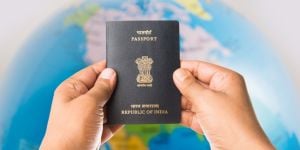French and Indian Marriage and conversion
ENG :
Hello, I'm french ans my boyfriend is Indian (hindu) and I would like to go live in India and marry him.
But I have somes questioons about it :
1. If I get married, sould I convert to his religion ?
2. Will he lose his cate by marrying me ?
3. What will happen to our futur children ?
Thanks for the people who answer me, it's so importaant for me.
Have a good day / night 
I think this is a mistake. Just my opinion as a learned Hindū originally from the West. I think this is a mistake for him to marry a Western, a non-Hindū at that. He's probably aping the White Man, trying to bag a White Wife to "up his reputation." He apparently doesn't like women of his own kind, PROBABLY because he thinks you will do things in the privacy of the home that Indian women will not do (rightly so because such men can have a degraded opinion of women and has been westernized). Another possibility is that the man is simply ignorant of the fact that several points that make a person a Christian (if you are one) is diametrically opposite that of a Hindū. I'll give you six points:
1 A Hindū does not see oneself as a sinner, never, ever. A Christian ALWAYS does. The former sees beyond the body and the mind. The Christian thinks one is the body and the mind.
2 A proper Hindū says namaste because he knows he and everyone else are divine beings having a human experience for some time. A Christian will never agree to this and instead "believe" that they are human beings striving for that elusive spiritual experience as sinners.
3 A Hindū has a symbiotic and respectful relationship with Mother Earth. A Christian does not. Look at the Middle East, where Christianity originated, and observe that it is a desert that resulted from the destruction of the land through lack of knowledge and connection to the land, which happened for thousands of years and continues well into this present era. It's happening everywhere, where the land degradation through economic activities of modern civilization continues unabated, especially on American tribal lands (look up Stop Line 3 protests and Keystone Pipeline protests).
4 Hindūs are in general vegetarian and know that all living beings have what is mistranslated as "souls." Christians are trained to think that we are the only ones with "souls," and therefore animals are pets, property to be used, and sources of food even when it is not necessary with availability of plant foods.
5 Hindūs have a completely different understanding of what you call "God" is. The both of you won't agree on this if you are honest about this particular topic. Brahma, The One who has manifested all the deities we know and revere, is NOTHING like the Christian god who is jealous, vengeful, angry, wrathful, and insecure - a god that is seemingly beset with human limitations.
6 Hindūs can have many kinds of relationships with any or all of the deities, unlike Christians, who are limited to father-child-command-type relationships. There are many nuances of such relationships in Hindūism that simply do not and CANNOT exist in Christianity. One example of that is the three layers of deities as found in individuals, families, and in cities villages. You have have a situation where everyone in the family have different deities of their own, and the family deity may or may not be the same as anyone of the personal deities of the family members, and even that one may be different from the village/city deity. AND, it is MUTUALLY ACCEPTED, not merely "tolerated," that this can happen. That is not the case AT ALL within the Christian communities in general, which is why you have entire families oriented within a single denomination, OR you may have in fragmented families where one goes to this church, another goes to another church, and the two butt heads over the differences with merely a veneer of "tolerance" for other denominations. Tolerance is NOT the same as acceptance.
I'll add a seventh component - science and "religion." In Christianity and in the West in general, science and religion have always had an uncomfortable, "kludgy" relationship because the two, from disparate parts of the world reflecting completely different mindsets, were never meant to be put together, so one doesn't tolerate the other, NEVER MIND accept one another. In contrast in Hindūism, science and spirituality GO TOGETHER because it was meant to be from the ground up. In fact, there is a particular Hindū text that you can read or recite to get the value of pi, if you know the numerical conversion process.
Last point about question 1 - Hindū dharma is not religion, because it is not based on belief, but on directly-experienced knowledge that one can see clearly. Hindū dharma is also not religion because it includes the totality of living on Earth as human beings, the sciences of astronomy, mathematics, engineering, etc. Even the language, Sanskrit itself, is a scientific language and SOLELY responsible for the existence and operation of computers, smart phones, and everything else that requires a circuit. English is a hodge-podge mess, and even I'm losing bits and pieces of the English pronunciation exceptions table and the spelling exceptions table in my head the longer I continue to recite texts in Sanskrit (currently reciting the Mahābhārata in Sanskrit, Hindī, and English since 2017 and continuing for maybe another 10 years) because Sanskrit is "what you see is what you say" with scientific rules for pronunciation.
Question 2 - you will have to ask his family that. You will have to ask how they feel about marrying outside of a thousands years old tradition that is the ONLY ONE of 46 civilizations to survive colonialism.
(for your information, I am largely European, with gene pools from different parts of India, Native America, Central America, even NW Africa. I want to say that I am Native European [like one who is a traditionalist in America would assert their Native American identity], but the reality is that our Nativeness from the pre-Christian era was stripped from us anywhere from 1800 to 500 years ago, depending on where your European ancestors are from. You are reading this from a person who has decolonized nearly completely and went fully back to the ancient Native tradition of Indian Hindūs)
Now, correction about the word "caste." That is a Portuguese-origin word that does not have a place in Hindū society. Europeans AND Muslims imposed their ideas of caste from their own cultures onto Indians. Caste as is PRACTICED in the West is the cause of all the inequity that exist today in this world. Caste is a mistranslation of the Sanskrit word "varṇa" because the idea of a vertical organization of society does not exist in a true Hindū society. Varṇa is not organization of a person's life based on birth. It is based on 3 types of characteristics of a person's mental makeup that tends a person toward knowledge, administration/defense, business, or service to these three other groups and agriculture/animal husbandry in general.
You had better find out whether his family will accept this sort of a marriage before you go ANY further.
Question 3 is also rife with problems - you are combining the DNA of two disparate groups of people with completely different epigenetic histories, cultural histories, etc. You could end up with confused children because they will be exposed to your thinking as well as the father's thinking, both mentally and socially (in the home environment), "Am I a sinner or not?" among many other questions that arise from confusion about the conflicting characteristics of Hindū Dharma and Christianity. The problem IS, when your father teaches them the Hindū way, and you teach them the Christian way, you are basically asking the children to take sides, because you CANNOT BE BOTH at the same time. What I mean by epigenetics is that there will exist in the minds a confused state because they could have a mental impression that is dominant in the genes from BOTH parent. Even DNA tests have shown that, for instance, two siblings can vary a fair bit in the ethnicity makeup, like one could show more French than the other sibling, or even have one or two gene pools not found in the other sibling. What I'm pointing to is the possibility that one child will choose to be Hindū, and the other will gravitate towards Christianity. To me, confusion reigns supreme in an environment like this.
You have a major issue that you are personally faced with. How attached are you to your French/Christian identity? If you are willing to convert simply to marry this man and have a family, that's a HUGE mistake because people who try to do this generally do not survive going around the spiritual bend to the completely different way of life and thought that makes the Hindū what he is. We call this the U-Turn, a very common thing that happens to westerners who want to abandon their Christian/non-Hindū ways and is lost. It goes like this.
1 They are earnest students of a new tradition
2 They start to find things that are unpleasant to their sense of who they are
3) They take the things that they like and appropriate that
4) And they reject the things that are objectionable to them WITHOUT finding out why these things are there in the first place
5) But they find out that there are core aspects of Christianity/Westernism that they simply cannot let go of (because they are too tied to that identity) and end up u-turning back to their home culture. We see this a lot, even with Europeans who practiced Hindūism or other dharmic traditions after 20-30 years. This happens because eventually, the contradictions add up and become unresolvable. Another reason it can happen is that one is missing their birth families, their birth cultures, the sense of familiarity of their home environment, the sense of COMMUNITY, "the way it was back then," and so on. People like to be comfortable.
The difference between you and I at present is that I consider India to be one of my ancestral homelands, and thus it is home to me. I feel I belong because I have Indian ancestry, and because of epigenetics and my personal history, I came into Hindūism on my own and discovered that I was on this path all along just when I was 49 in 2015. If I had known that I am Hindū in my 20s, I would have left America and never looked back. I feel like I come "back home" every time I come to visit. So, I don't consider India to be "out in the field away from home."
Whatever you do, I wish you the best of luck in this endeavour and carefully think this through THOROUGHLY.
Wow thank you very much for answering me, I was lucky to have come across you, thank you for the new knowledge and help you gave me😁
As far as I'm concerned I'm not a Christian, I don't have a religion so I don't think I would have any problems about it.
But thank you for helping me understand. 
You are very welcome. That you are not Christian puts you somewhat closer to being open to learning about Hindūism and whether you are prepared to go around the bend into Indic thought, Indic identity, and so on. Message me, and we can chat more about this. I'd be happy to answer your questions.
🙏🏼
Bonjour Lily,
Same situation here and it turned out very wonderfully. Been living for 7 years and don’t get discouraged by small and silly things.
Highly recommend is that you come to India and see how things are before you make the call.
Not everywhere is similar, it’s like very very very diverse.
You don’t have to convert as there isn’t a process. If you believe in the culture and religion, you are already a Hindu.
You can also take all the good things from cultures and religions and make it your own. Just like what I did.
Try it out is a must and people are people and there are some that weird, some bad and most are good.
Good luck.
Bonjour Lily!
I m Indian( Hindu) and my husband is French (Catholic). We have been together for 12 years now and have a child together. we lived in India for a very long time and have recently moved back to Europe. so I believe I may be able to speak from experience
1) Should you convert?
that is up to you however, please understand that you don't have to convert. there is no obligation on either party to change their religion. if you plan to live in a major city in India, there is no social or societal pressure either. however, you must be sure his family is ok with you either way.
2) will he lose his caste?
firstly, it just p*sses me off to think that in this modern time, well educated youth still think of castes and discrimination. no, he wont lose his caste. and frankly, if he is worried about this, I m afraid it is not a good choice in a life partner with such an orthodox thought process. but hey, not everyone is the same
3) future children?
you can choose which nationality you would like your children to have. if you choose French, you can get that done at the Consulat general de France. not a problem. register their birth and you will have French passports. same goes for Indian nationality. they will automatically get it if you do not choose French nationality.
you decide how you would like to raise your children and what values to instill in them. they dont have to be exclusively Indian/ French.
aas a word of advice, i very highly recommend that you come to india and live here for atleast 2-3 years before you marry your beloved. it is a massive cultural shock and india is not the image they have in the west. it is very difficult to accept the indian way of life (not talking about hindu way of life). it is Very Very Very different. also, please ask your partner if they intend to live with their parents/ family. it is the normal way in india and is usually assumed that the boy and daughter in law live at the boy's house, with his family. if so, be prepared to live with them forever. it was definitely not for me, i love my privacy and my right to intimacy with my partner/ children. also the status and role of a woman in an indian society/ household is far lower than in the west. Despite what the constitution may say, Equality is not practiced and women are expected to be lower/ less capable and have assigned gender roles especially if living with indian families. Also, form lots of personal experiences, it is not very safe for women in general. if you are blonde, be extra careful as you become a beacon of attraction, the wrong kind.
Make your relocation easier with the India expat guide

Sports in New Delhi
New Delhi is the official national capital of India. The city is rich with a population of all age groups with a ...

Developing your social circle in New Delhi
New Delhi is home to a wide variety of people from different backgrounds and cultures. Everyone here has varied ...

The work culture in New Delhi
Being the official national capital of India, New Delhi is a rich city with a population of all age groups and ...

The Indian lifestyle
India offers its visitors an invaluable experience if you are looking forward to a new way of life. The country ...

Customs in India
If you are looking forward to moving to India, make sure you abreast yourself with all the rules and regulations ...

Moving with your pet to India
If you are looking forward to moving to India with your pet, make sure you seek all the relevant information ...

Visas for India
Just like any other country, India requires you to have a valid visa and a passport for staying in the country. ...

Working in Hyderabad
Originating from the state of Andhra Pradesh, Hyderabad is one of the oldest, most prosperous and biggest cities ...
Forum topics on formalities in India




